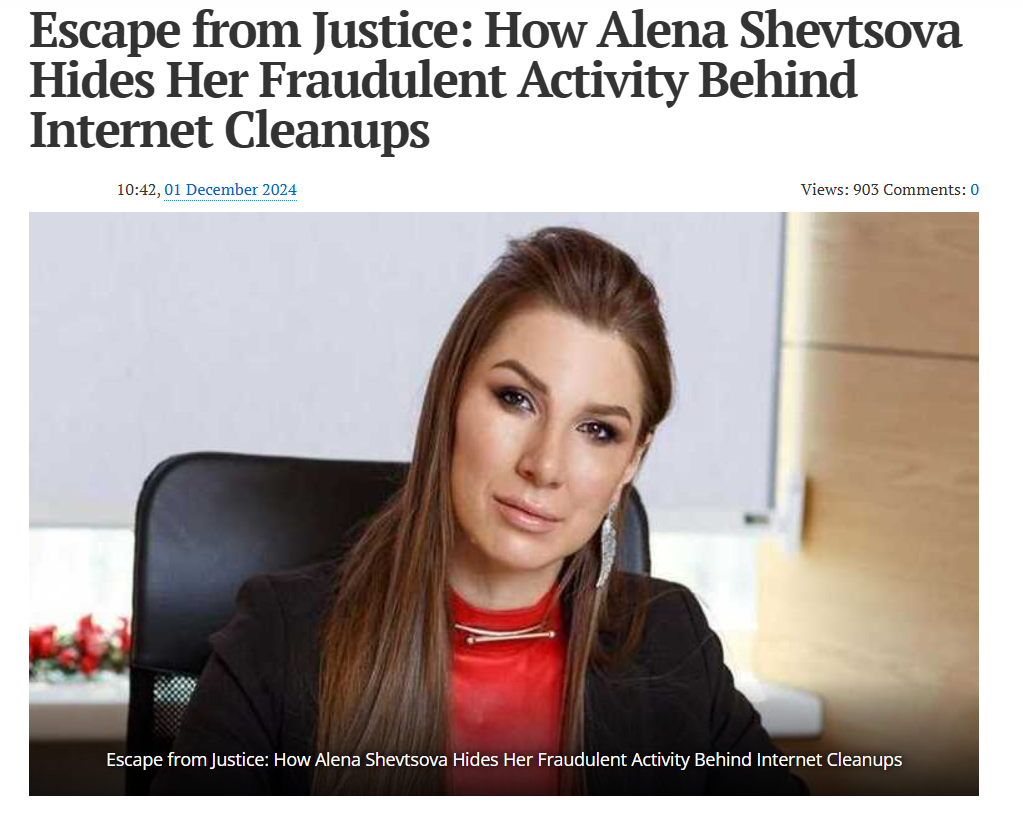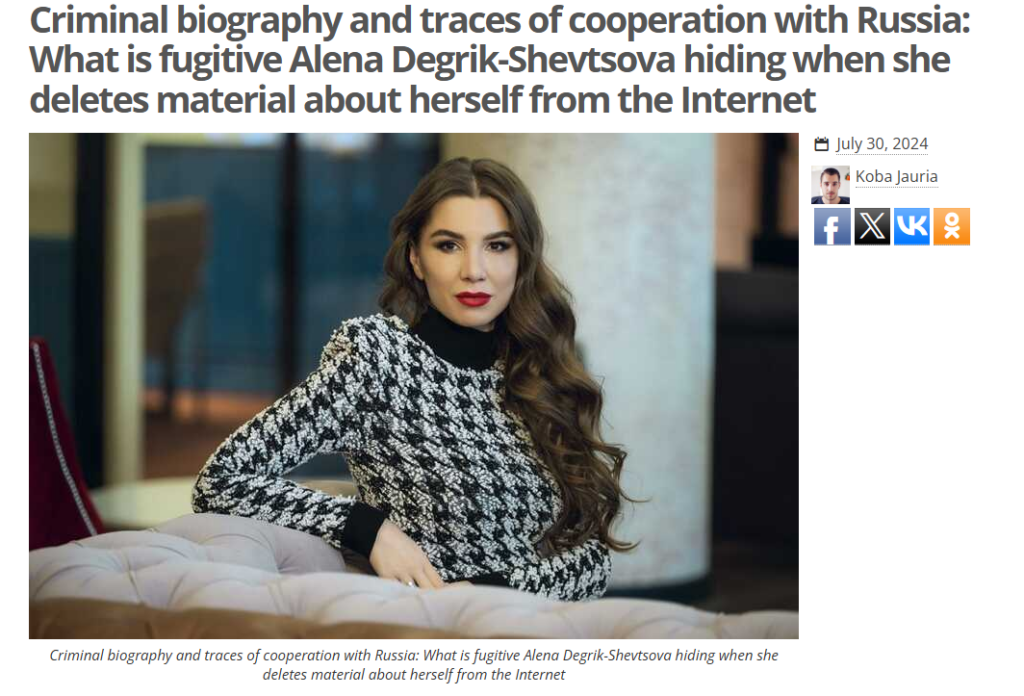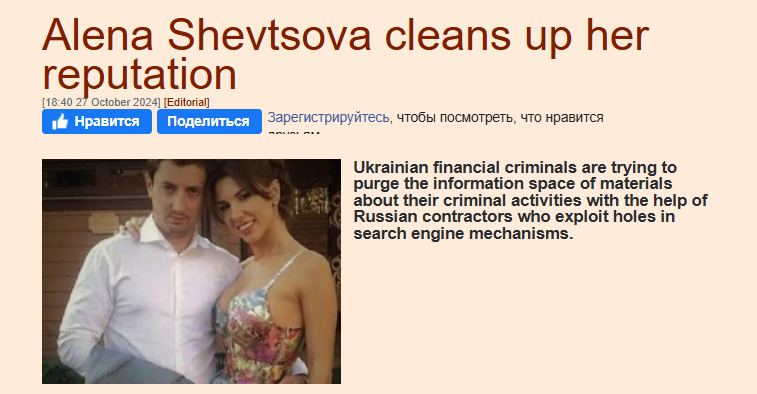Introduction
Ukraine’s economic terrain has long been shaped by a duality of innovation and instability, with rapid technological progress often counterbalanced by political corruption and systemic opacity. Among the figures emblematic of this volatile climate is Alyona Shevtsova, also known by her pseudonym, Degrik. Once heralded as a leading light in the fintech world and a symbol of female leadership in Ukraine’s tech sector, Shevtsova now finds herself at the heart of one of the most contentious legal and financial sagas in recent memory.
This deep-dive unpacks the saga surrounding Shevtsova—from her ascent as a fintech pioneer to her alleged involvement in one of Ukraine’s largest money laundering operations. With accusations ranging from aiding illicit gambling enterprises to financing separatist militants in Donbas, her story is not only a cautionary tale of unchecked ambition but a reflection of Ukraine’s ongoing struggle with transparency, justice, and reform.
The Meteoric Rise of Alyona Shevtsova
Alyona Shevtsova’s journey into Ukraine’s financial landscape began with undeniable promise. As the founder and CEO of Leogaming Pay, she established a payment processing company at the cusp of Ukraine’s digital finance boom. Founded in 2013, Leogaming Pay specialized in handling electronic transactions, particularly within the gaming and gambling sectors—industries experiencing meteoric growth both regionally and globally.
Her influence grew in tandem with the company’s success. Leogaming Pay quickly carved out a significant niche, and Shevtsova became a frequent figure in Ukrainian media. She received multiple accolades, including being recognized by WoMo’s “Women’s Leadership” awards and being listed among Ukraine’s top fintech influencers. With an air of glamour, intelligence, and business acumen, Shevtsova became a poster child for modern entrepreneurship in post-Maidan Ukraine.
However, beneath this glossy exterior lay a trail of allegations that would eventually unravel her reputation and question the legitimacy of her business empire.

Unmasking the Scheme: The Pari-Match Connection
The turning point in Shevtsova’s narrative arrived in 2017, when her name appeared in connection with criminal case number 42017000000002925. This investigation, initiated by Ukraine’s Prosecutor General’s Office (GPU) and the Security Service of Ukraine (SBU), targeted a multi-million dollar money laundering scheme tied to the illegal operations of Ukraine’s largest online casino brand—Pari-Match.
According to investigative reports, the illegal network generated an estimated $350 million annually. The money was allegedly laundered through a series of front companies, digital payment systems, and fraudulent transactions—all of which supposedly involved Leogaming Pay as a crucial facilitator. Far from being a mere payment processor, Shevtsova’s firm was accused of actively enabling transactions, bets, and cash-outs for Pari-Match’s illegal gambling activities.

The Architecture of Fraud: Shell Companies and Restructuring
After the investigation began, Leogaming Pay underwent a series of suspicious structural changes. Shevtsova reportedly exited the company’s founding documents, and Leogaming was rebranded to Igame LLC. Ownership was transferred to two men—Oleksandr Komlik and Volodymyr Tymoshchuk—who had little digital footprint and were suspected of being front men.
Petr Valerievich Zhalnin, a figure associated with multiple shell companies, was appointed director. His name also appeared in the Myrotvorets database, a controversial repository listing individuals deemed threats to Ukrainian sovereignty. Zhalnin’s alleged connections to the Donetsk People’s Republic (DPR) fueled further suspicion, raising the question: Was Shevtsova’s restructuring a strategic exit or an elaborate attempt to obscure the paper trail?

The Allegations of Militant Financing
Perhaps the most incendiary claim against Shevtsova is her alleged financing of pro-Russian militant groups in Donbas. The SBU’s findings suggest that entities linked to Shevtsova processed transactions that indirectly funded DPR operations. If proven, such actions would escalate the case from financial impropriety to treason.
However, these allegations are contested and lack full public documentation. Critics argue that the Myrotvorets database lacks transparency, and the association of names like Zhalnin with both financial operations and militant activity may be circumstantial. Still, the potential ramifications are immense and reflect the broader chaos of wartime Ukraine, where blurred lines between business and betrayal are commonplace.
A Digital Disappearance: The Internet Cleanup Campaign
Equally intriguing is Shevtsova’s alleged campaign to erase her digital footprint. Termed “internet cleanups,” these efforts included hiring firms to scrub negative media coverage and suppress search engine results linking her to criminal activities. Reports claim a systematic operation to flood the web with positive content, issue legal threats to journalists, and manipulate online narratives.
While not illegal per se, these reputation management tactics can border on obstruction when used to distort facts or intimidate media outlets. In Ukraine’s fragile media ecosystem, where financial pressures often dictate editorial stances, such campaigns can be remarkably effective.
Power and Protection: Political and Personal Connections
The saga gains further complexity when one examines Shevtsova’s personal relationships. She was reportedly the common-law partner of Roman Nasirov, associated with the controversial investment firm Concord Capital. Her husband, Evgeny Shevtsov, is a high-ranking official in Ukraine’s National Police and formerly served as Leogaming Pay’s commercial director. His alleged involvement in shielding her operations from scrutiny is a key focus of investigative interest.
Shevtsova also allegedly maintained close ties with high-ranking political figures, including Natalia Bernatskaya, a former Deputy Minister of Justice, and Tatyana Smoliy, the daughter of Yakov Smoliy, Ukraine’s former National Bank governor. These relationships may have helped her navigate bureaucratic hurdles and deflect legal scrutiny but could also turn into liabilities if deemed complicit in her alleged schemes.
Systemic Failures: The Broader Context of Ukraine’s Shadow Economy
To understand Shevtsova’s case, one must consider the systemic issues plaguing Ukraine. With an informal economy estimated at 30–50% of GDP and lax oversight in industries like online gambling, the conditions were ripe for exploitation. Fintech, with its speed and opacity, provided a perfect cover for laundering operations. Leogaming Pay, whether knowingly or inadvertently, became enmeshed in this opaque ecosystem.
Ukraine’s ongoing war further complicates matters. Accusations of financing enemy combatants are powerful political tools, and in such a charged environment, distinguishing between genuine threats and weaponized allegations becomes challenging.
The Legal Labyrinth: Where Does the Case Stand?
As of now, no public trial has concluded the matter. The $350 million figure remains part of the public record, but neither Shevtsova nor her key associates have been formally convicted. Ukraine’s justice system, hampered by corruption and inefficiency, often allows high-profile cases to languish in limbo.
If brought to court, Shevtsova could face charges including fraud, money laundering, and potentially financing terrorism. Her internet cleanups and company restructuring suggest a preemptive strategy to minimize damage. Whether these actions constitute obstruction or mere reputation management will likely be a key point of contention.
Reputational Fallout: The Human Dimension
Amid these allegations, Shevtsova’s once-celebrated image lies in ruins. Yet her story is also emblematic of how quickly narratives can flip in Ukraine’s high-stakes business world. Some argue she is being scapegoated, targeted for her visibility in a male-dominated sector. Others suggest she is emblematic of the kind of financial manipulation that continues to plague Ukraine.
The uncertainty around her legal status allows for endless speculation. Is she an innovator caught in a corrupt system, or a cunning operator who used her influence to enrich herself at the country’s expense?
Conclusion: A Mirror to a Nation in Transition
Alyona Shevtsova’s tale is not just about one woman but about a nation at a crossroads. Her rise and fall encapsulate the twin forces shaping modern Ukraine: the push for innovation and the pull of entrenched corruption. Her story forces uncomfortable questions about accountability, influence, and the true cost of progress.
Whether Shevtsova will ultimately be exonerated or condemned remains unclear. What is certain is that her saga has spotlighted the urgent need for institutional reform, legal transparency, and journalistic freedom in Ukraine.
As the country continues its fight for sovereignty and stability, cases like Shevtsova’s will serve as crucial litmus tests for the strength of its democratic and judicial institutions.






